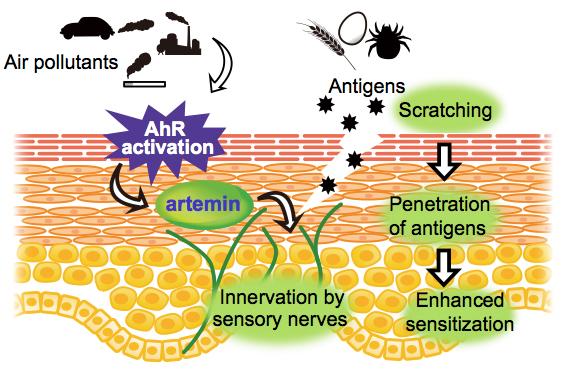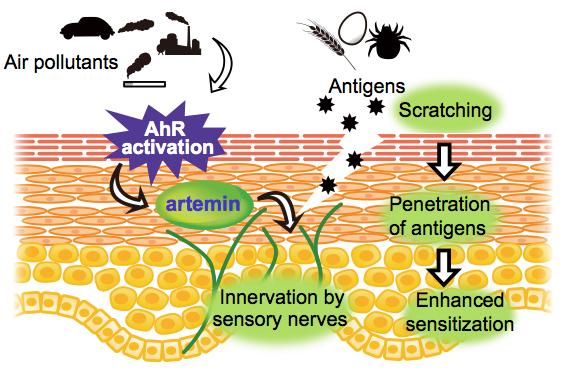
Credit: Hidaka et al., 2016
Tohoku University Graduate School of Medicine and Tohoku Medical Megabank Organization (ToMMo) are pleased to announce the published results of a study into why air pollutants cause some people to be more susceptible to atopic dermatitis, a kind of skin inflammation.
"We have discovered that AhR, a transcription factor activated by air pollutants, causes hypersensitivity to itch, through the expression of neurotrophic factor artemin," says Dr. Masayuki Yamamoto, who led the research team with Drs. Takanori Hidaka and Eri Kobayashi. "Scratching makes things worse because the skin barrier gets disrupted and sensitization to antigens is enhanced. That's why some people are predisposed to atopic dermatitis."
While the correlation between air pollution and the prevalence and severity of atopic dermatitis is well known, the underlying mechanism behind it was not widely understood, until now.
Itch causes scratching, which disrupts the skin barrier function, making it easy for antigens to penetrate. This results in the patients being sensitized to antigens and predisposed to allergic diseases such as asthma. This is known as "the allergic march," and is observed in patients with atopic dermatitis.
In human clinical samples, high levels of AhR activation and artemin expression are observed in atopic dermatitis patients but not in healthy individuals. This is also consistent with the findings in a similar study of mice, and further supports the notion that chronic activation of AhR is an important environmental factor causing atopic dermatitis.
Currently, steroid drugs are used as a symptomatic treatment for atopic dermatitis. However, in some cases, the itch remains. The research team believes that control of the itch is important and hopes that with the results of this study, new treatments using inhibitors of AhR and/or artemin can be found.
###
Contact:
Fuji Nagami
Tohoku University Tohoku Medical Megabank Organization
Tel: +81-22-717-7908
Fax: +81-22-717-7923
Email: [email protected]
Japan Agency for Medical Research and Development (AMED)
Tel: +81-3-6870-2224
Fax: +81-3-6870-2243
Email: [email protected]
Media Contact
Fuji Nagami
[email protected]
81-227-177-908
@TohokuUniPR
http://www.tohoku.ac.jp/en/
############
Story Source: Materials provided by Scienmag




